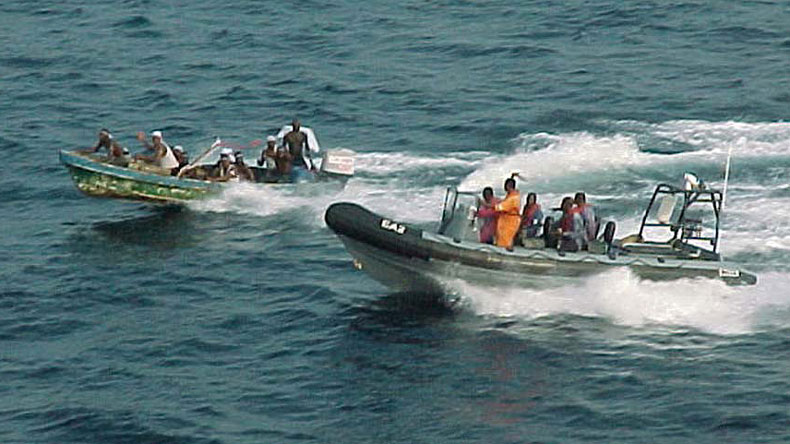Piracy in the Gulf of Guinea affects a number of countries in West Africa as well as the international community.
By 2011, it had become an issue of global concern. Pirates in the Gulf of Guinea are often part of heavily-armed criminal enterprises, who employ violent methods to steal oil cargo.
In 2012, the International Maritime Bureau, Oceans Beyond Piracy and the Maritime Piracy Humanitarian Response Program reported that the number of vessels attacks by West African pirates had reached a world high, with 966 seafarers attacked during the year.
According to Control Risks, pirate attacks in the Gulf of Guinea had by mid-November 2013 maintained a steady level of around 100 attempted hijackings in the year, a close second behind Southeast Asia.
Piracy in the Gulf of Guinea has evolved over the first decade of the century. For some time, smaller ships shuttling employees and materials belonging to the oil companies with any involvement in oil exploration had been at risk in Nigeria. Over time, pirates became more aggressive and better armed.
As of 2014, pirate attacks in West Africa mainly occur in territorial waters, terminals and harbours rather than in the high seas. This incident pattern has hindered intervention by international naval forces.
Pirates in the region operate a well-funded criminal industry, which includes established supply networks. They are often part of heavily-armed and sophisticated criminal enterprises, who increasingly use motherships to launch their attacks.
The local pirates’ overall aim is to steal oil cargo. As such, they do not attach much importance to holding crew members and non-oil cargo and vessels for ransom. Additionally, pirates in the Gulf of Guinea are especially noted for their violent modus operandi, which frequently involves the kidnapping, torture and shooting of crewmen. The increasingly violent methods used by these groups is believed to be part of a conscious “business model” adopted by them, in which violence and intimidation plays a major role.
By 2010, 45 and by 2011 64 incidents were reported to the UN International Maritime Organization. However, many events go unreported. Piracy acts interfere with the legitimate trading interests of the affected countries that include Benin, Togo, Côte d’Ivoire, Ghana, Nigeria, and the Democratic Republic of Congo. As an example, trade of Benin’s major port, the Port of Cotonou, was reported in 2012 to have dropped by 70 percent.
The cost of piracy in the Gulf of Guinea due to stolen goods, security, and insurance has been estimated to be about $2 billion. By mid-November 2013, pirates in the Gulf of Guinea had launched around 100 attacks during the year.
The international community has expressed concern over the increasing number of reports of piracy in the Gulf of Guinea. The IMB Piracy Reporting Centre reported that the range of the attacks is extending and the level of violence against the crews is “dangerously high”.
In November 2011 Secretary-General Ban Ki-Moon assembled a team to examine the situation. As a result a recommendation was made to convene a regional summit as to form a united front by the affected West African countries. It was recognized that the area needs a comprehensive maritime security framework across national boundaries to fight piracy. Further, technical and logistical help is needed from the international community.
The United States military Africa Command (Africom) started joint naval training exercises with affected West African countries.
According to the International Maritime Bureau, pirate incidents off the West Africa seaboard in 2012 increased to 34 from 30 the previous year.
On 19 November 2012, the United Nations Security Council held an open meeting to discuss piracy in the Gulf of Guinea, among other areas. The debate, which was the first held by the Security Council about this subject, was called by Indian Ambassador Hardeep Singh Puri and heard more than 40 speakers from different countries and international organizations.
Several speakers noticed that while acts of piracy in the Indian Ocean were declining due to coordinated naval operations, piracy in the Gulf of Guinea was intensifying. They suggested applying lessons learned there to the Gulf of Guinea, “including a focus on modernizing counter-piracy laws, strengthening capacities for maritime law enforcement and crime investigation, supporting regional networks and increasing knowledge sharing.”
According to a joint report by the International Maritime Bureau, Oceans Beyond Piracy and the Maritime Piracy Humanitarian Response Program, the number of vessel attacks off the coast of West Africa had by 2012 surpassed those in the Indian Ocean, where piracy was by contrast sharply on the decline.
West African pirates attacked 966 seafarers during the year, holding hostages for a shorter period of four days on average.
However, captives in West Africa were at a much greater risk of violence, with five hostages reportedly killed there in 2012 compared with no fatalities elsewhere.
Pirate incidents off the coast of Indonesia similarly rose from 2011’s total of 46 to 51.
Copyright Ships & Ports Ltd. Permission to use quotations from this article is granted subject to appropriate credit given to www.shipsandports.com.ng as the source.
